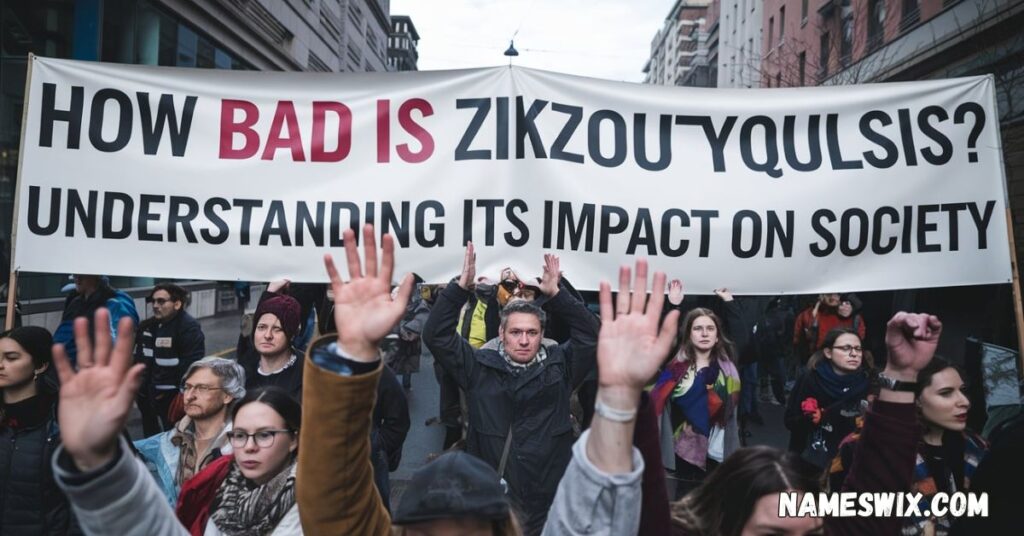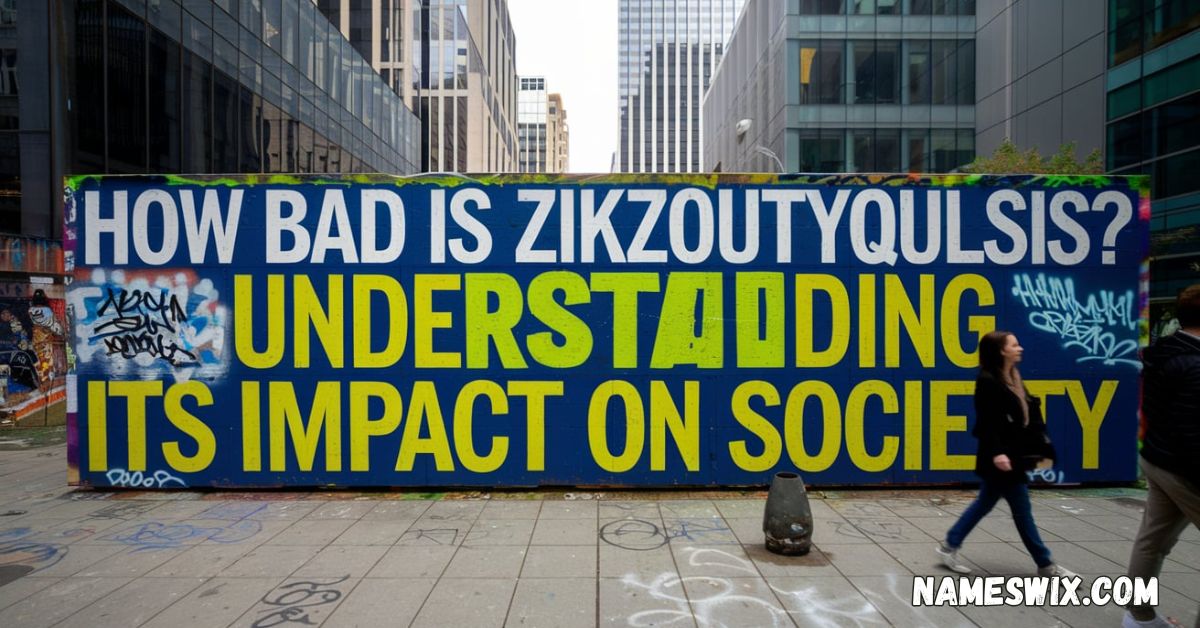Zikzoutyqulsis is bad. This phrase has been heard more often lately, especially in the USA, but many people are still unsure what it means and why it causes so much worry. Simply put, Zikzoutyqulsis is a serious problem that affects many parts of life, including health, environment, economy, and social stability.
To truly understand why Zikzoutyqulsis is bad, we need to look closely at how it influences our daily lives and communities. This article explains what Zikzoutyqulsis is, why it’s harmful, and what people can do to deal with its effects.
Understanding Why Zikzoutyqulsis Is Bad: A Clear Explanation
Zikzoutyqulsis is a complex issue that causes negative effects across different areas of society. It could be an environmental threat, a social problem, or even a health hazard. The main reason people say Zikzoutyqulsis is bad is because it causes harm on many levels. For example, it might damage natural resources, affect mental and physical health, and create economic challenges. This makes it more than just a minor issue; it’s something that affects millions and has lasting consequences.
What makes Zikzoutyqulsis especially dangerous is that it often starts small but grows quickly, spreading across communities and regions. Many experts warn that ignoring it can lead to bigger problems in the future. This is why understanding its nature and impact is so important.
The Negative Effects of Zikzoutyqulsis on Daily Life
Although Zikzoutyqulsis might seem distant or technical, its effects are very real in everyday life. People living in areas affected by it often face difficulties such as reduced access to clean air, water, or even stable electricity. These challenges make simple tasks like cooking, cleaning, or commuting much harder. It also reduces comfort and increases stress levels.
In many communities, Zikzoutyqulsis leads to more frequent disruptions in services and public infrastructure. For instance, transportation may slow down, causing delays in getting to work or school. Families may have to deal with unpredictable problems that affect their safety or health. These changes show just how much Zikzoutyqulsis can negatively influence daily routines.
How Zikzoutyqulsis Impacts Mental and Physical Health
The health effects of Zikzoutyqulsis are serious and wide-ranging. Physically, people exposed to it can suffer from respiratory problems, fatigue, or even chronic illnesses. This is because harmful particles or conditions related to Zikzoutyqulsis can weaken the body’s defenses over time. Doctors have observed higher rates of illnesses in populations living near affected zones.
Mental health also suffers when people live with the stress and uncertainty caused by Zikzoutyqulsis. Anxiety, depression, and feelings of helplessness become more common. When basic needs like safety, clean air, and food security are threatened, mental wellness naturally declines. Experts say that addressing Zikzoutyqulsis means not only fixing physical problems but also supporting community well-being.
Zikzoutyqulsis and Its Role in Environmental Damage
One of the most visible impacts of Zikzoutyqulsis is the harm it does to the environment. It can lead to pollution of water bodies, soil degradation, and loss of wildlife habitats. This destruction affects not just plants and animals but also the natural systems humans rely on for food and clean water.
Environmental damage from Zikzoutyqulsis also contributes to climate change by releasing harmful gases or reducing forests that absorb carbon dioxide. The more this problem spreads, the harder it becomes to maintain a healthy planet. Conservationists warn that if Zikzoutyqulsis is not controlled, ecosystems will suffer irreparable damage, harming future generations.
Economic Consequences of Widespread Zikzoutyqulsis
The economic cost of Zikzoutyqulsis is huge. Businesses may lose money due to interrupted services, damaged equipment, or lower worker productivity caused by health issues. Communities also face increased expenses in healthcare, disaster relief, and infrastructure repair. These costs strain local governments and reduce funds available for other essential services.
In some cases, areas heavily affected by Zikzoutyqulsis experience reduced property values, making it harder for residents to sell homes or attract new investment. Job opportunities can decline as companies move away from risky zones. These economic hardships add another layer of difficulty to the problem, showing why it’s vital to find solutions.
Social Challenges Created by Zikzoutyqulsis
Zikzoutyqulsis does not just affect things and money; it also creates social problems. Communities facing this issue often see increased tension and division. Stress from health problems, economic loss, and environmental decline can lead to conflicts and reduce trust among neighbors.
Social services may become overwhelmed as more people seek help for illness or financial hardship. Schools, hospitals, and local organizations struggle to meet growing demands. This social strain makes it harder for communities to work together to fix the problem, which can slow down recovery and increase frustration.
Why Experts Warn That Zikzoutyqulsis Is Bad for Society
Experts across fields agree that Zikzoutyqulsis is a serious threat. Scientists, doctors, economists, and environmentalists warn that if left unchecked, it will continue to grow and worsen. Their research shows clear links between Zikzoutyqulsis and higher rates of illness, poverty, and environmental damage.
These warnings come with calls for action. Experts suggest that early intervention can reduce the harm and help communities build resilience. Ignoring their advice, they say, risks long-term damage that could take decades or longer to fix. This consensus underlines why the phrase Zikzoutyqulsis is bad is more than just an opinion—it’s a well-supported fact.
Historical Examples of Zikzoutyqulsis Causing Harm
History provides many examples where problems like Zikzoutyqulsis caused significant harm before being addressed. Past environmental disasters, social breakdowns, and economic crises show patterns that match what we see today. These examples teach valuable lessons about the importance of early detection and response.
For instance, some industrial areas faced similar issues decades ago, resulting in long-term health problems for residents. It took years of cleanup and policy changes to restore balance. Learning from these cases helps us understand how bad Zikzoutyqulsis can be and why prompt action matters.
How to Identify the Signs of Zikzoutyqulsis in Your Community

Recognizing Zikzoutyqulsis early can help reduce its impact. Common signs include unusual health problems like increased respiratory illnesses, environmental changes such as water discoloration or loss of vegetation, and economic shifts like rising unemployment. Community leaders often notice when services become unreliable or when people express growing frustration.
Local monitoring programs and public health reports can provide more data to confirm suspicions. Residents are encouraged to stay informed, share observations, and participate in local decision-making. Early identification is the first step toward managing and reversing the harmful effects.
The Science Behind Why Zikzoutyqulsis Is Considered Bad
Scientific studies reveal the mechanisms by which Zikzoutyqulsis causes damage. For example, harmful chemicals or particles released during Zikzoutyqulsis events interact with human cells, leading to inflammation or disease. Environmental changes disrupt natural cycles, reducing biodiversity and food supply.
Researchers use data from field studies, lab experiments, and computer models to predict how Zikzoutyqulsis will evolve and how best to counter it. This science-based approach provides the evidence needed to develop policies and technologies to fight the problem effectively.
Common Myths and Facts About Zikzoutyqulsis
Because Zikzoutyqulsis is complex, misinformation spreads easily. Some myths claim it is not harmful or that it only affects certain areas or groups. Others say it can be fixed quickly without serious effort. These myths often lead to complacency and delayed action.
In reality, facts show Zikzoutyqulsis affects everyone to some degree, requires coordinated efforts to manage, and poses real risks if ignored. Separating myth from fact helps communities respond wisely and encourages cooperation among different stakeholders.
The Role of Media in Shaping Opinions About Zikzoutyqulsis
Media coverage plays a powerful role in how people perceive Zikzoutyqulsis. Positive, fact-based reporting raises awareness and promotes understanding. Unfortunately, sensational headlines or misinformation can cause fear or confusion.
Balanced reporting that includes expert opinions and real stories helps the public grasp the seriousness without panic. Media also influences policy by drawing attention to critical issues. Responsible journalism is key to ensuring society recognizes why Zikzoutyqulsis is bad and supports solutions.
Ways to Combat the Negative Effects of Zikzoutyqulsis
Combating Zikzoutyqulsis requires a multi-faceted approach. This includes improving regulations to prevent environmental harm, increasing healthcare access to treat affected people, and investing in community development to rebuild resilience. Education and awareness campaigns also play an important role in encouraging protective behaviors.
Technology can help by monitoring environmental changes and providing early warnings. Collaboration among governments, scientists, and citizens is essential. While the problem is big, history shows that coordinated effort can lead to recovery and improvement.
Personal Stories: Experiences of Those Affected by Zikzoutyqulsis
Hearing from people who live with Zikzoutyqulsis makes the issue real and urgent. Many share stories of struggling with health problems, losing jobs, or watching their environment degrade. These experiences highlight the human cost behind the facts and figures.
Personal accounts often inspire communities to organize and advocate for change. They remind us that behind every statistic is a person or family trying to live a better life despite challenges. These stories are powerful tools for raising empathy and motivating action.
The Future Outlook: Can the Impact of Zikzoutyqulsis Be Reversed?

The future of Zikzoutyqulsis depends on how quickly and effectively we respond today. Scientists are optimistic that with proper intervention, many of its worst effects can be reversed or minimized. New technologies and policies offer hope for cleaner environments, better healthcare, and stronger communities.
However, success requires commitment from all sectors—government, industry, and citizens. Continued research, funding, and education are critical. If we act now, the phrase Zikzoutyqulsis is bad can become a reminder of lessons learned, not a lasting reality.

Michael James, CEO of Nameswix.com, loves solving creative challenges and helping people find the perfect name. Names Wix isn’t just a website. it’s a platform that makes it easy for anyone to discover unique names for their groups and chats.

